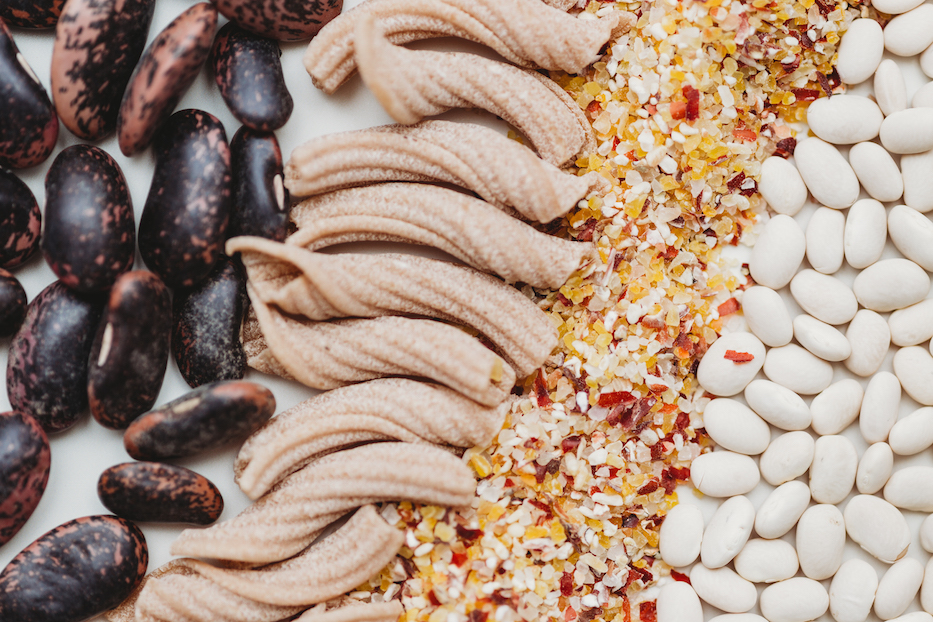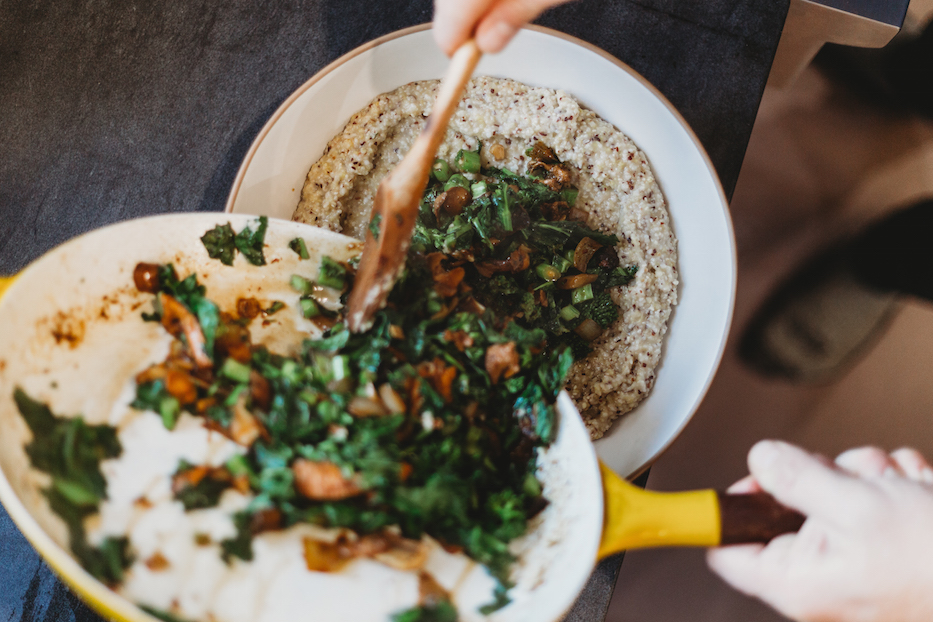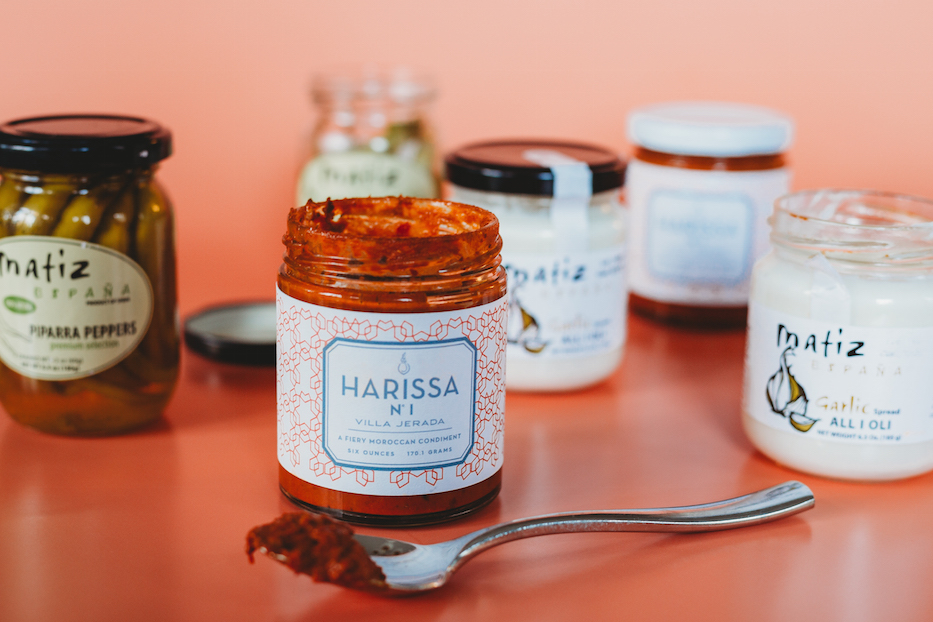
Arts & Culture | Culinary Arts | COVID-19

| Ben Simon, at home. Meghan Olsen Photos. |
Ben Simon has worked for years to shift the conversation on where people’s food comes from. What he didn’t count on was doing it from his East Rock home, in the midst of a global pandemic.
Simon is the founder of Ben To Table, a subscription-based delivery service that focuses on non-perishable, shelf-stable ingredients like dry beans and grains, spices and sauces, pastes, flour, and chocolate. The young business, which he runs between his East Rock home and a warehouse in West Haven, offers monthly options and specific boxes packed with dry goods.
“The basic idea is an online subscription service for interesting food, for people who don’t need a meal kit,” he said. “It’s like Stitch Fix for your pantry. The hope is that it can meet a need, help people explore different types of cooking, different ways to make meals and bring flavors together.”
Ben To Table began as an idea after Simon moved from San Francisco to New Haven two years ago, and could no longer find the dry beans that he wanted at a nearby bodega—or at any store in the area. In the place of weekly recipes and ingredients, his subscribers build up their kitchens with hard-to-get pantry staples, like hot pepper from California, small-batch milled corn, whole grain flour, and dried huitlacoche.
That formula is a marriage of Simon’s longtime sense of culinary adventure and interest in rethinking big agriculture. Born and raised in Maryland, Simon is the child of a public school teacher and academic who “were foodies before it was a thing,” replacing birthday gifts with dinners out.
As a kid, he grew up hearing about how his parents had scrimped and saved their way through the 1970s to go to France each summer, where they would spend as little money as possible in order to eat one or two nice meals during the trip.

| Meghan Olsen Photos. |
It instilled in him an early love of food. When his mother passed away during his childhood, Simon found himself cooking meals with his dad and older brother. Now, as a dad himself, he said he’ll take the extra 10 minutes required—if he can get them—to make a meal more flavorful and fulfilling. It seems to be rubbing off: a recent video on his social media feed showed his daughter making cornbread.
“I’ve always been raised to be interested in eating well, which doesn’t mean fancily,” he said. “It’s caring about what the food I’m eating tastes like in a real and deep way. And how to make that happen. Feeling responsibility for my own part in that.”
That sense stayed with him as he transitioned into the professional workplace, hopping between political campaigns until he landed at Greenpeace in 2013. While working for the organization as a consultant—including work with Greenpeace India, Greece, and Brazil, and campaigns like the Arctic 30 and this response to Typhoon Hagupit—his job took him around the globe. After meetings during the day, he would go out at night and explore a given city’s culinary life.
He remains part of the Mobilisation Lab that broke off from Greenpeace in 2017 to work with other human advocacy groups. The work has made him think about reimagining global food systems, which remain dominated by industrial, single-crop agriculture. Even before COVID-19, he pointed out, a global reliance on monoculture had the potential for large crop failures and health risks to farmers and farm laborers. The virus has only amplified that reality.

| Meghan Olsen Photos. |
“The industrial agriculture system, which is how most of our food is made, is destroying the planet,” he said. “It requires significantly higher use of fertilizers and pesticides, which are harmful for our ecosystems and especially for the farmers themselves. The people actually applying the chemicals. Ultimately, it makes us much less resilient in terms of the food we’re producing. And it makes the food less tasty—things get bred for yield instead of flavor.”
In that sense, Ben To Table is also meant to support polyculture, a method of growing smaller quantities of multiple crops in a more environmentally and agriculturally sustainable way. He focuses on shelf staples that are grown and sold by small-scale retailers, who work in turn with small farms and farmers across the globe. Monthly shipments are based on flavors specific to certain regions of the world, so that there might be a month dedicated to India, another to Mexico, and another to France.
In one month, a box might include beans from Rancho Gordo, milled corn from South Carolina, a Catalan garlic spread and tinned clams from Spain. In another, a subscriber might receive turmeric from Diaspora Co., run out of Oakland by Sana Javeri Kadri, or mole paste from Guelaguetza, an Oaxacan restaurant and market in Los Angeles, or huitlacoche, a fungus that grows on corn, from Grupo de Hongo Zeta Endotzi.
“Each thing makes sense on its own, but can be greater as the sum of its parts done in a collective way,” he said. “It’s very much my style of cooking that I’m asking people to come along with, which is not super recipe-driven. It’s more sort of, technique and flavor driven.”
For instance, those tinned clams. Canned fish might not seem seductive to the average eater, he joked. But it’s actually more sustainable—and has a much lower carbon footprint—than fish that one might buy at a market in New Haven.

Meghan Olsen Photos.
“Often we have an image of tinned seafood as sort of a sad can of tuna fish, or a scary can of sardines that’s been in our grandmother’s cabinet for like 40 years,” he laughed. “But, it can be so much more. And getting right with eating more seafood like that, and less that is fresh flown in, is a good thing.”
When COVID-19 hit New Haven last month, he assembled a provisions-minded kit of dry goods—beans, milled corn, rice and “a little bit of chocolate” for good measure—that could feed a family or individual for months. Because many of his suppliers work closely with the restaurant industry, "I shudder to think" how they are faring economically in the crisis.
So far, he’s been able to keep giving them business as their other orders dry up, a model that Olmo and Atticus Market have also piloted with local beer, flour, honey, and cheese. On his end, orders have picked up as people worry about nonperishables and settle in for what may be weeks more of state-mandated physical distancing.
He’s still unsure what long-term strain the pandemic will put on the business, he said. As he navigates his way through it, he's been getting the word out about Ben To Table through social media, as well as campaigns like #TogetherNewHaven.
“If it grows, I think we have the potential to reshape the food system,” he said. “I don’t think we’re anywhere close to that yet, but that’s certainly my hope. The question of ‘how do we help more people find and appreciate food that is grown better?’ is a big part of the question of ‘how do we shift away from an industrial agriculture system?’”
Find out more about Ben To Table here.

